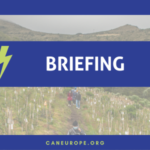‘Nature is in a state of crisis’ (European Union NBSAP, 2023). Nature and biodiversity in the EU is declining, with most protected habitats and species in poor or bad condition due to land and sea use changes, overexploitation, harmful forestry practices, pollution, and climate change. The EU did not meet the 2020 Biodiversity Strategy goals and has proposed an improved 2030 Strategy. The new strategy aims to fill existing gaps, ensuring ecosystems are healthy, climate-resilient, and rich in biodiversity, while providing essential ecosystem services. The strategy sets ambitious targets that focus on restoring ecosystems, protecting intact areas and marine habitats, and sustainable farming and forestry. This strategy was submitted in early August to the Convention of Biological Diversity (CBD) COP as part of the National Biodiversity Strategies and Action Plans (NBSAPs) within the Kunming-Montreal Global Diversity Framework.
A crucial pillar of this strategy is the famous and hard-fought Nature Restoration Law (NRL). Despite the importance of halting biodiversity loss and restoring nature and ecosystem services, the NRL faced fierce opposition throughout the legislative process (see more on ‘Breaking the Gridlock: Overcoming Political Challenges to Restore Nature’). The opposition came from political forces who either still have not understood the linkage between nature restoration and climate action or played their own political agenda. Gladly, the adoption process finally crossed the finish line on June 17 and the NRL was published in the Official Journal of the European Union on July 29.
This policy brief aims to shed light on the main features of this important piece of legislation, but also to highlight aspects that were watered down due to compromises during the legislative process.
Download the Policy Brief: Nature Restoration Law Essential Progress in Biodiversity and Climate Action – Implementation will be key


